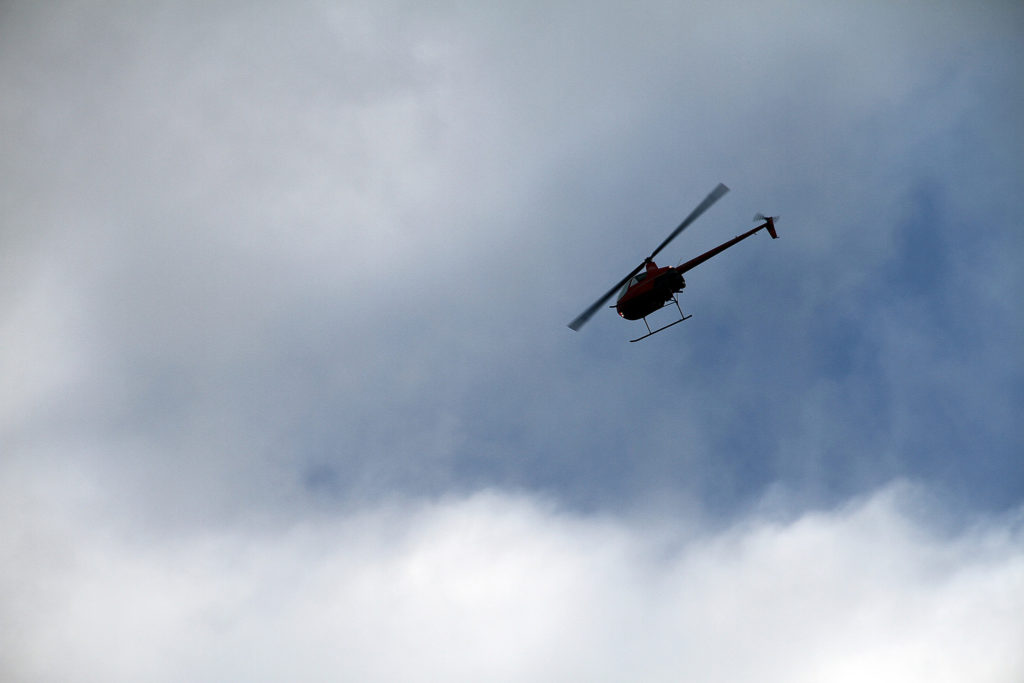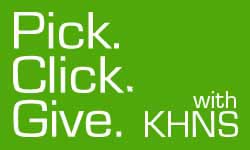
Georgia Sampson discusses options for magnifying glasses and digital readers with Elijah Haines, considering strength, size and cost (Corinne Smith/KHNS)
Loss of vision can be frustrating, but there are many tools and strategies for continuing activities and tasks of daily life. That’s the focus of The Alaska Center for the Blind and Visually Impaired. The non-profit holds low vision clinics in communities throughout the state, and this week they are in Haines and Skagway. KHNS’ Corinne Smith has more.
Life-long Haines resident Georgia Sampson is in her eighties. She’s wearing a soft pink sweatshirt and a white mask seated across from a low vision therapist with the Alaska Center for the Blind and Visually Impaired. On the desk between them is a selection of magnifying glasses of different sizes.
“I like this one,” she said, picking up a 4x hand-held magnifying glass with a built in light.
Sampson is at the clinic seeking assistance for macular degeneration. That’s an eye disease that causes blurring of the central vision.
“I was making a trip to Juneau every six months for the exam,” Sampson said. “And she kept telling me, it’s not changing. Well, I kept saying why am I coming down here every six months? But anyway, then I got cataracts.”
She got surgery at a clinic in Wasilla last summer, but she said vision didn’t improve.
“And so I’m right back where I was,” she said. “I couldn’t read the date on things, I couldn’t even read the label on some of the stuff in the store
Glasses don’t help, but for now Sampson is able to drive in the daytime. She said she has promised to stop driving when she can’t see anymore, but for now she’s able to and relishes her independence. She runs errands for herself and her husband, also in his eighties, and she says at the grocery store she has been asking employees to help her read the labels.
“I go to the Chilkat Center for tai chi twice a week. I don’t always drive because I can’t always see it’s too dark,” she said. “I go to the grocery store, weather permitting, or the post office and that’s as much as I drive. So it’s not fun. But people are so helpful… it just makes me want to cry,” she said tearing up. “But that’s life, and I know I’m not alone.”
She’s not alone. In Alaska, over 14,000 people of all ages – or roughly 2% of the population – reported vision difficulty, according to a 2019 survey by the American Foundation for the Blind, and the numbers are most likely higher.
Helping Sampson with her vision is Elijah Haines, a low vision therapist and rural outreach coordinator with the nonprofit. He travels around the state to see people in towns like these to share tools and strategies for vision and mobility help.
“Most people are coming to us, because they’ve stopped doing something that they liked or had to do,” Haines said. “Maybe they stopped working, because they weren’t able to see their computer, or they were unable to see something they’re trying to do at work. Reading is, of course, a huge challenge for a lot of people. So maybe they’re not able to read their mail and handle their bills and finances. A lot of you also challenges with mobility. So maybe in low light, like our long winters we have or gray weather here in Southeast, people are having trouble walking to the store, walking around their neighborhood, walking to school or to work. So we look at the mobility side of things as well, too.”
Haines says he travels with equipment for people to try out and see what can be helpful.
“Yeah, I travel with almost 100 pounds of devices and things. So typical devices are, of course magnifying glasses, we have video magnifiers, large print materials. I travel with sunglasses and filters as well, which are very helpful for a lot of eye conditions. I travel with long white canes as well, for people who need to start using that to have independence and safety when they’re walking around. A little bit of everything,” Haines said. “There’s tons of really useful tools and gadgets for people with vision loss. And I think it’s really nice for people to come to one of our clinics because they can sit down and see all of those at once and try them out, and see what’s practical.”
Prior to the low vision clinic in Haines, Sampson had received a kit in the mail with several magnifiers to try out for reading and bright orange markers for her stove and washing machine to mark the settings.
Clinics are free, but cost can be a challenge. Medicare often does not cover vision, and some of the devices can be thousands of dollars. So the nonprofit’s low vision therapists like Haines help with reaching out to local charitable organizations or grants to cover those costs.
“There’s certainly a lot of people, Alaskans around the state who ultimately don’t get those devices, because there just isn’t the funding and if something is $500 or $1,000. That’s a huge chunk out of somebody’s budget. So there’s a big need that’s not going to be filled.”
This is the first low vision clinic in Haines in over two years due to the pandemic, and Haines says that they have been able to fill some of that need in rural communities by sending out kits with devices and doing phone consultations. While they’re working to meet that backlog, he says the greater issue is challenging society’s low expectations for people with vision loss.
“Like for someone who’s blind, a lot of people assume that they can’t use a computer, or they can’t walk on their own. And we really need to challenge that because it’s just totally bogus,” Haines said. “If someone has the right training and tools and opportunities, they can do all of those things. And so it’s really those low expectations that keep people stunted, and really keep people from finding independence.”
The center partners with local organizations for outreach and to connect with local resources. Southeast Alaska Independent Living or SAIL hosts the low vision clinics in upper Lynn Canal, and can help people with obtaining vision devices, where possible and how to use them.
And after today, Sampson has a new handheld magnifier for reading those labels in the store, the newspaper, or whatever she needs.
Low visions clinics will be in Haines on February 2 and in Skagway on February 3. Clinics are free of charge, and financial assistance is available to go toward tools like magnifiers and sunglasses. To make an appointment or for more information, call Elijah Haines at (907) 771-4307.









Very cool, Elijah.